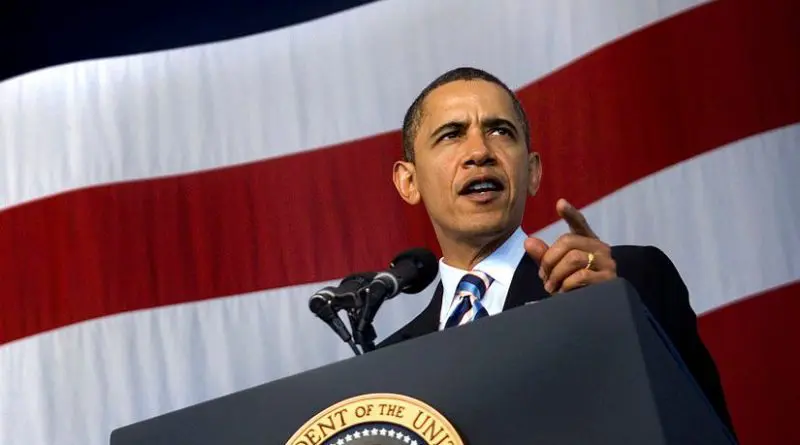Obama Says Burma Has ‘Failed Demonstrably’ To Combat Drug Crime – OpEd
By Patrick Tibke
U.S. President Barack Obama has slammed Burma (Myanmar) for failing to combat illicit drug production in its northern border states, as Washington names and shames its weaker allies in the global war on drugs.
In a report released to Congress on Monday, Burma was among 22 countries that have “failed demonstrably in the past 12 months to make any meaningful effort to adhere to their obligations under international counter-narcotics agreements,” according to the U.S. State Department.
Every year, as part of the U.S. Foreign Relations Authorization Act (FRAA), the president must submit to Congress a report detailing the “major illicit drug producing countries” or “major drug-transit countries that significantly affect the United States”.
This year, Burma was one of just five Asian countries to make the list, along with Afghanistan, Pakistan, India, and Laos.
In a speech to Congress earlier this week, Obama said that “countering illegal drug cultivation in Burma and Laos will require strengthening of state institutions and sustainable economic development,” adding that the fight against illicit drug production in the Golden Triangle is “vital to the national interests of the United States”.
Since 2006, Burma’s illicit opium crop has tripled to almost 150,000 acres, whereas Afghanistan’s opium crop, by far the largest in the world, is thought to be around 550,000 acres.
In addition, Burma is thought to be the largest producer of methamphetamine in Asia, supplying most of the Southeast Asian mainland, as well as Bangladesh, India, and China. In 2013, almost 85 percent of China’s seizures of methamphetamine took place in Yunnan province, which shares its long, mountainous border with Burma’s notorious Shan states. Laboratory testing carried out by China’s National Narcotics Control Commission (NNCC) later confirmed that 90 per cent of methamphetamine tablets seized nationwide in 2013 originated from Burma.
Burma’s status as Asia’s most prolific meth lab poses an enormous challenges to regional security, economic stability, and public health. But such trends are of less concern for the U.S., where Mexican cartels are thought to control around 90 percent of the domestic methamphetamine market.
Until recently, the U.S. and Burmese governments did not see eye-to-eye. But with democratic reforms slowly taking shape, and with Obama’s “pivot to Asia” looking to counter Chinese influence in the region, the two countries have re-established ties.
In 1988, the U.S. broke off all economic and diplomatic relations with Burma following the military crackdown on student protestors in Yangon, which led to between 3,000 to 10,000 deaths.
In 2008, however, Burma’s ruling junta, the State Peace and Development Council (SDPC), inaugurated a new constitution as part of its “roadmap to democracy,” whereby civilian politicians would be entitled to hold up 75 per cent of seats in parliament.
Sensing a genuine willingness for democratic reform, the U.S. scaled up humanitarian aid to Burma in 2011, and removed restrictions on World Bank and IMF assistance to the new government. A year later, the U.S. removed restrictions on foreign direct investment in Burma, and named its first ambassador to Burma in over 22 years.
Burma’s once stagnant and isolated economy has prospered tremendously in recent years, growing by 7.8 percent in 2013 and 8.5 percent in 2014. But its problems with illegal drug production have worsened.
Ethnic rebels in the north of Burma, such as the Kachin Independence Army (KLA) and the Ta’ang National Liberation Army (TNLA), have accused the Burmese government of actively participating in the drug trade, whilst at the same time claiming to be cracking down on it.
The government’s new model of drug production, according to the rebels, is to broker ceasefires with rebel groups, and then enlist former rebel soldiers as members of ad hoc, pro-government militias, who are then given free rein to produce and traffic drugs in territories under their control.
An excellent documentary by journalist Chris Veits, released this July by Journeyman Pictures, depicts this very phenomenon, as TNLA soldiers intercept huge hauls of heroin and methamphetamine headed for pro-government soldiers.
As of 2014, the United Nations Office on Drugs and Crime (UNODC) has stepped in to try and stem the flow of illegal drugs from Burma, particularly heroin driven by Burma’s opium crop. But it faces an uphill battle due to ongoing conflict between rebel groups and the Burmese military.
Last year, the UNODC began a new pilot scheme which aims to promote coffee as an ideal substitute for Burma’s poppy farmers. A small group of poppy farmers in southern Shan State have already agreed to substitute at least part of their opium crop for coffee beans, raising hopes that, should the program be successful, other farmers will follow suit.
As part of the new program, the UNODC is supplying free fertiliser, free coffee seeds and other assistance to 450 poppy farmers across “a handful of villages.”
Jochen Wiese, the UNODC’s chief technical advisor for alternative development in Burma, believes that the high altitude of Burma’s northern provinces will produce high yields of quality coffee suitable for export.
See the UNODC’s crop substitution scheme in action in a short film by the New York Times, below, beautifully produced by NYT’s China correspondent, Jonah Kessel:

